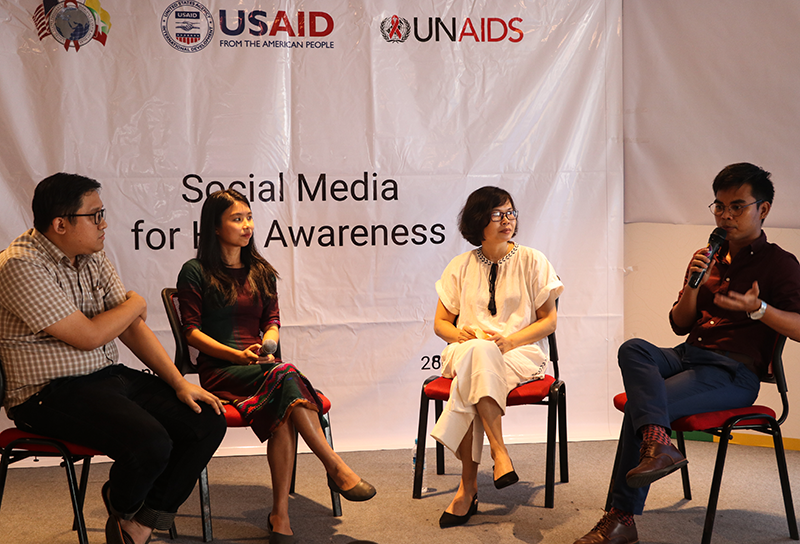|
On June 16, 2018, more than 70 members of Hpa-An’s Township Health Department (THD), local authorities, and women’s organizations gathered in Hpa-An to participate in efforts, supported in part by Community Partners International (CPI), to control the spread of the dengue virus.
Following the ‘Social Media for HIV Awareness’ panel discussion, the USAID HIV/AIDS Flagship (UHF) Project held a social media training workshop to equip UHF partners and civil society organizations with the tools necessary to implement HIV-awareness campaigns. The workshop, attended by 38 participants from 15 organizations, was organized by Community Partners International (CPI) and led by Tham Tran, Senior Marketing and Communication Manager at PATH-USAID/Healthy Markets in Vietnam, and Thant Sin, Tech 4 Peace Lead at Phandeeyar.
 Left to right: Dr. Hein Ko Ko, Deputy Director (Technical Unit of TOP), Population Services International; Saijai Liangpunsakul, ICT & Innovation Advisor (UHF Project), Community Partners International; Tham Tran, Senior Marketing and Communication Manager, PATH-USAID/Healthy Markets; and James Repdos, Digital Director, Havas Riverorchid Myanmar. Photo: Community Partners International Social media has been under the microscope recently for all the wrong reasons. However, it can have positive applications, and significant impacts, as a tool for public health awareness. On May 28, 2018, the USAID HIV/AIDS Flagship (UHF) Project hosted a panel discussion in Yangon entitled, ‘Social Media for HIV Awareness’ to explore a key question: How can digital and social media be used to reach and engage key populations for HIV prevention, testing and treatment services?
As part of an ongoing series of forums to raise awareness of and engagement with Universal Health Coverage (UHC) among civil society organizations (CSOs) in Myanmar, Pyi Gyi Khin and Community Partners International (CPI) organized a CSO Health Forum in Sagaing Region on June 5-6, 2018. The forum brought together 116 representatives of 79 CSOs implementing health care activities in Sagaing Region, and 9 members of the Sagaing Region Hluttaw (Parliament).
The precarious shelters that house the estimated 900,000 Rohingya refugees in Cox’s Bazar, Bangladesh, offer scant resistance against the monsoon rains now sweeping this region. Landslides and flash floods are significant and ever-present threats facing these communities seeking refugee from communal violence in northern Rakhine State, Myanmar. As part of wider disaster preparedness efforts, Community Partners International (CPI) is training and supporting a network of Rohingya Community Health Volunteers (CHVs), embedded in refugee communities throughout Cox’s Bazar, to provide safe rescue and first response services in emergencies.
Community Partners International (CPI) is working with HOPE Foundation for Bangladesh (HOPE) to provide ambulance services for the Rohingya refugee population in Cox’s Bazar, Bangladesh. CPI is helping HOPE to operate a fleet of three ambulances ready to respond day or night to medical emergencies in the refugee camps and transport patients quickly and safely to an appropriate health facility for specialist care. As well as upgrading the HOPE ambulances, CPI is helping to equip, support and train the ambulance staff.
|
AuthorCPI Admin Archives
July 2024
Categories
All
|
|
|
COMMUNITY PARTNERS INTERNATIONAL
580 California St Fl 16, Ste 1658, San Francisco, CA 94104-1068, USA [email protected] +1 510 225 9676 We are a registered nonprofit 501(c)(3) Public Charity. TAX ID 94-3375666 |
©
Community Partners International

 RSS Feed
RSS Feed
